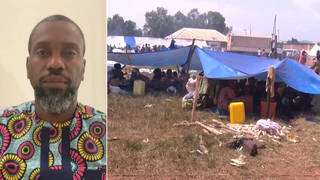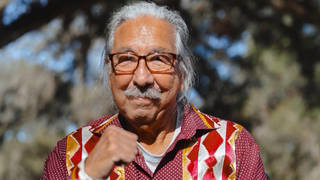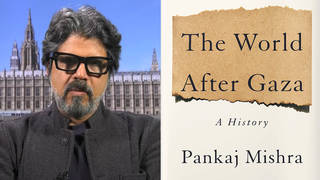
Related
The Israeli Military Advocate General has for the first time called for criminal inquiries into the conduct of Israeli troops in Gaza. The request came in response to soldiers’ testimonies that described loose rules of engagement, troops firing on unarmed civilians, and troops intentionally vandalizing property during the three-week assault on Gaza. We speak to Gaza-based journalist Amira Hass of the Israeli newspaper Haaretz. [includes rush transcript]
Transcript
JUAN GONZALEZ: The Israeli Military Advocate General has for the first time called for criminal inquiries into the conduct of Israeli troops in Gaza. The request came in response to soldiers’ testimonies that described loose rules of engagement, troops firing on unarmed civilians, and troops intentionally vandalizing property during the three-week assault on Gaza. The soldiers’ accounts are published in the Israeli daily Haaretz and based on statements made a month ago by graduates of the Yitzhak Rabin pre-military preparatory course.
Defense Minister Ehud Barak told Israel Radio that the incidents would be examined and added, quote, “We have the most moral army in the world.”
AMY GOODMAN: We’re joined now on the line from Gaza by Haaretz correspondent Amira Hass.
Amira, welcome to Democracy Now! The Haaretz
newspaper describing this as a several day exposé, Israeli soldiers in their own words, talk about its significance.
AMIRA HASS: Its significance, of course, is that the soldiers actually confirm what Palestinians have been telling for the past three months, and journalists who listen to Palestinians and believe Palestinians and know their work of taking affidavits and testimonies from Palestinians have done so during the last three months. This is the main importance, because it’s — we don’t know the exact locations of this.
And it’s not the only — it’s not the only incident. Some Israelis might get the impression that the soldiers who spoke spoke about the only incident of killing civilians and of very lenient — lenient rules of engagement, and this is not true. The whole attack — the three weeks of attack were characterized by these attacks on — almost indiscriminate attacks on civilians, attacks on people who carried white flags, attacks on rescue teams, not to mention the attacks from the air at whole civilian neighborhoods.
So I would say that — of course, it was not my report. Haaretz did a great job at putting a lot of emphasis to this testimonies of soldiers. It drew attention to what many Israelis managed to ignore during the last three months.
JUAN GONZALEZ: And some of the specific incidents that were described? I understand one in which an elderly Palestinian woman was walking along the road, was ordered to be shot by some soldiers in a house?
AMIRA HASS: Yeah, if I know — look, there are several such cases. I, myself, have run into — I didn’t manage to write about it all, but I know about specific — one specific old woman who walked in a certain neighborhood. I don’t know if they talk about the same woman or another one. They talk about a woman who was killed with her two children. Now, I got a phone call by the field worker of B’Tselem, the field worker who is here in Gaza, and he told me, “I found a family, only that it’s not two people who were killed. It’s five people or four people. And the mother was not killed; she was wounded.” So it doesn’t mean that everything that the soldiers — it doesn’t mean that everything was exactly as it is described, or that there are many other incidents that we don’t — we haven’t reached yet.
AMY GOODMAN: Amira Hass, you’re back in Gaza. We’re about to go to the well-known story — Anjali Kamat saw you in Gaza, Democracy Now! producer — of the Palestinian gynecologist whose voice shocked, stunned Israel, as he wailed on television —-
AMIRA HASS: Yeah.
AMY GOODMAN: —- that his daughters and his niece had been killed. He was a well-known voice on Israeli television. Could you just introduce it for us, the significance of that moment?
AMIRA HASS: This is just another incident that — it happened by accident to a guy who used to — who works in Israel, who speaks Hebrew, who knows many Israeli big shots and many journalists. So he could call a friend of his who works on Israeli TV and tell him live what was happening. So, for the first time, Israelis believed what was said during the previous two weeks or three weeks of these attacks.
So, again, the — I mean, then he went to — then he was allowed to go with his wounded daughter to a hospital in Israel. This is luxury that not everybody got or most of the people could not get. He could be rescued very quickly. This is — many other Palestinians could not be rescued at all, not even to a Palestinian hospital. And there, he could talk to people and to journalists. So, again, the significance is that his case managed to break a wall, an Israeli wall of unwillingness to know. But the problem is that then people take it as an exceptional case, as an exceptional that tells about the rule. But we know this exceptional case is not exceptional at all.
AMY GOODMAN: And in just the brief amount of time we have left, the situation in Gaza today?
AMIRA HASS: Look, it’s — now it’s back to being the huge prison that it was before. It is a huge prison. People cannot leave, cannot — people cannot come. There is a great need of reconstruction, and they’re leaving the political problems aside. People leave [inaudible] and staying with friends. They have — they don’t have glass in the wall — in their windows; they have nylon, because there is no glass getting into Gaza, nor any construction materials.
And the people who were — all people still remember the fear, the terrible fear, in which they lived. This is a common experience of one million and a half. And tens of thousands or hundreds of thousands who encountered direct shooting are still affected. Either it’s the bereaved families or the wounded or people whose houses were destroyed. It’s not gone. It’s not something which belongs to the past.
AMY GOODMAN: Amira Hass, I want to thank you for being with us. She is an Israeli journalist with the Israeli newspaper Haaretz. She lives in Gaza. This is Democracy Now! When we come back, you’ll hear the words, the wailing, of the Palestinian doctor on Israeli television, and then Democracy Now!’s Anjali Kamat visits him two months later, this past week in Gaza. Stay with us.












Media Options